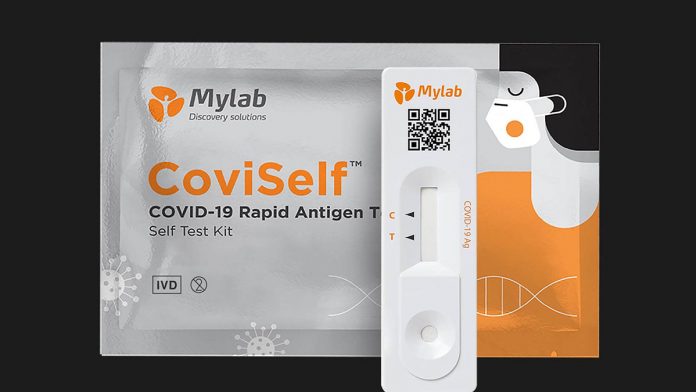India’s first home kit for COVID-19 Test manufactured by Mylab Discovery Solutions at Rs 250 Only

A home Covid testing kit will be available in India, for the first time ever, from next week onwards at a nominal price of Rs 250.
In an advisory issued Wednesday, the Indian Council of Medical Research (ICMR) allowed the use of CoviSelf, the home testing kit manufactured by Mylab Discovery Solutions. The Pune-based molecular diagnostic firm was also the first to launch RT-PCR tests locally, a year ago.
The Covid-19 home testing uses rapid antigen tests (RATs) — a portable device that gives results within 15 minutes, similar to a home pregnancy test.
The kit detects protein antigen from SARS-CoV-2 in nasal swab samples from individuals with or without symptoms of Covid-19, and will be available at the retail chemists across India.
“For the last three months, our team of 25 scientists was working on the making of this product. It was very clear that sooner or later, we will need home testing kits for Covid-19 for early detection,” said Dr Gautam Wankhede, director of medical affairs at Mylab, who led the development of CoviSelf.
“The kits will be available in the market, most likely, from the early next week,” Dr Wankhede told ThePrint.
The company’s current production capacity is 70 lakh tests per week and this is expected to expand to upto 1 crore tests per week in the next two weeks.
This home testing kit is expected to ease the pressure on overburdened test labs and also reduce the gap in testing and results, which is more than 72 hours in some parts of the country. Samples don’t have to be collected by a healthcare professional for CoviSelf.
Making of India’s first Covid-19 home testing kit
Mylabs has been working on CoviSelf since January this year, attempting to perfect every aspect of the kit such as the design, ensuring safety of other family members and increasing the sensitivity of the product in diagnosing the virus in non-hospital settings.
“While we had received the marketing approvals for professional RAT kits last year, it took several months to fix the gaps for the test that has to be conducted by non-professionals in the home setting,” Wankhede said.
He added that the company specifically worked on increasing the sensitivity of the kit to ensure an accurate diagnosis. Sensitivity indicates the ability of the test to identify the virus and specificity indicates the ability to identify the correct kind of coronavirus.
However, the company did not disclose any details of the sensitivity and specificity data for the test kit. “It is as per the ICMR standards. Please note that positive means positive with this test,” said Wankhede.
The primary concern while designing the kit, he further noted, was that the sample will be collected by lay people and not healthcare workers. “We solved it as our kit won’t require people to go very deep inside their nose to collect the nasal swab unlike the professional testing.”
“Moreover, by mixing chemicals in the tube (in which the nasal swab will be diluted), the virus’ infectivity will be destroyed so that it doesn’t become hazardous for other family members,” explained Wankhede, who has earlier worked with the National Health Service (NHS), the publicly-funded healthcare system in the UK.
This test is authorised for non-prescription home use with self-collected nasal swab specimens for individuals aged 18 years and older or with adult-collected nasal swab samples for individuals aged 2 years or older.
Like Our Page To Get Blogs & Market Updates



